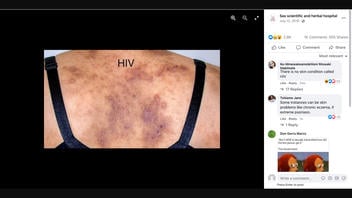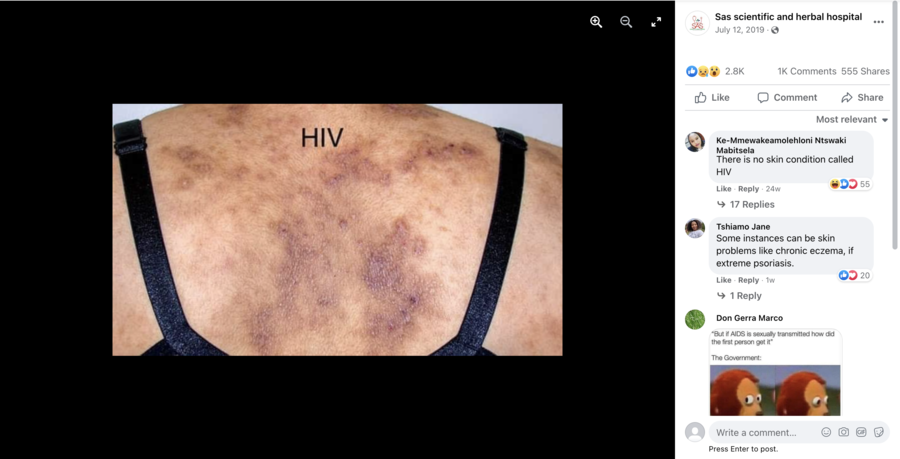
Does HIV cause a skin condition? Yes, that's sometimes true, but HIV-negative people also have this skin condition. A reverse image search on Google showed Lead Stories that the skin condition seen in the Facebook post below is called atopic dermatitis, or eczema. Dermatologists told Lead Stories that the photo in the Facebook post should not be a representative of HIV.
The claim appeared in a Facebook post (archived here) on July 12, 2019. The post showed a photo of someone with severe atopic dermatitis plus the word:
HIV
This is what the post looked like on Facebook at the time of writing:
Lead Stories conducted a reverse image search on Google, which showed the picture originated on the website DermNet NZ.
Lead Stories emailed several board-certified dermatologists about this claim. On January 6, 2021, Dr. Ross Radusky, who practices in Dallas, and Dr. Zain Syed, who practices in Dayton, Ohio, responded.
Lead Stories asked if he saw patients with eczema who are HIV-negative, Radusky said:
All the time. The takeway from the photo in question should not be that this is a representative photo of HIV. It is not. To clarify, HIV refers to the virus, the human immunodeficiency virus. Viruses don't look like rashes nor do they write themselves as such on our body. They are microscopic. Now, viruses can certainly cause skin rashes. We know from decades of studying the human immunodeficiency virus that many types of skin rashes and lesions can be seen as a result of infection, some of which are associated with a challenged immune system, such as in AIDS (Acquired immunodeficiency syndrome). Patients who are HIV+ can experience many itchy rashes that are similar in appearance to eczema.
Eczema on a person's back is very common, he added.
Asked if there are differences in eczema between someone who is HIV negative versus someone who is HIV positive, Syed answered:
Some HIV patients do have worse itching than the normal population, and there are cases of severe eczema linked to HIV (usually poorly controlled HIV that is untreated). On average, an HIV positive patient will have slightly more worse eczema than an HIV negative patient, but we see severe eczema in HIV negative patients everyday, and having severe eczema is not diagnostic of HIV.
The National Institute of Allergy and Infectious Diseases explains:
Eczema, or atopic dermatitis, is an inflammatory skin condition that affects an estimated 30 percent of the U.S. population, mostly children and adolescents. It is a chronic disease characterized by dry, itchy skin that can weep clear fluid when scratched. People with eczema also may be particularly susceptible to bacterial, viral, and fungal skin infections.














